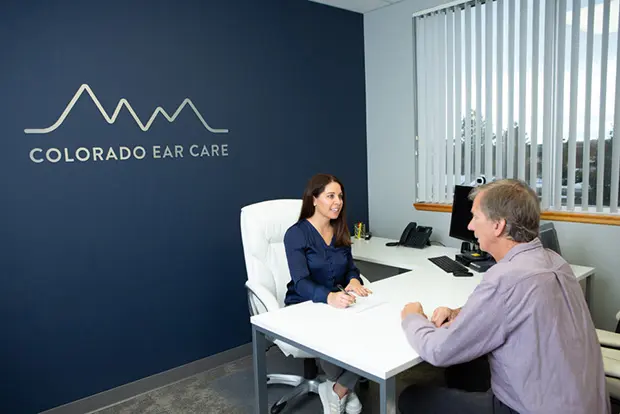The importance of regular hearing tests
From mental health issues to cognitive decline, the impact that hearing loss can have on your life beyond just your ability to hear is large. And, while some people actively choose to ignore their hearing loss, many people just don’t recognize they have hearing loss until it reaches more severe levels.
The reality is that most hearing loss happens slowly over time, so it can be hard to notice those day-to-day changes in your ability to hear. That’s why it’s so important to get regular hearing tests!
But, when hearing loss can be hard to detect, how do you know when you may need hearing aids to treat it? That’s a question we get a lot in our practice, and the answer is, “It depends.”
The signs of hearing loss
There are several different forms of hearing loss and each has an array of different causes. For example, conductive hearing loss is caused by a physical blockage or damage in your outer or middle ear, like a foreign object, ear wax buildup, or a hole in the eardrum. In contrast, sensorineural hearing loss is usually caused by damage to the hearing nerves or inner ear from things like illness, genetics, or loud noise.
Although different in cause, the signs and symptoms of hearing loss are generally the same, with the exception of conductive hearing loss, which can usually be recognized by its sudden onset or feeling something physically in the ear canal.
For other types of hearing loss, there are a few common signs that usually prompt people to get a hearing test. Not being able to hear the television at a normal volume is a big one. Having trouble hearing conversations, especially when there’s a lot of background noise, is another. When your friends and family have to speak louder to get your attention is a third.
In cases of noise-induced hearing loss, especially cases that are caused by sudden exposure to loud noise — like a gunshot or fireworks, for example —, hearing loss may be experienced as sounds being muffled immediately after exposure or even tinnitus, ringing in the ears.
Tinnitus itself can also be a sign of hearing loss, but it can also be caused by a number of other things, like certain medications or infections.
Whether or not you’re experiencing signs, it’s important to start getting your hearing tested annually starting at age 60 so that hearing loss can be caught and managed sooner than later.
How do hearing aids help with hearing loss?
Hearing aids may be small, but they are mighty, and they are made up of several key components that each play a role in helping you hear better and more clearly. Although there are some differences between the different styles of hearing aids (behind-the-ear, in-the-ear, etc.), they all leverage the same combination of technology.
There are three main components of hearing aids, the microphone, the amplifier, and the speaker, where the microphone captures sound, the amplifier converts the sound to digital signals, and the speaker delivers those signals to your inner ear. What hearing aids do, essentially, is replace the bodily functions that have depleted over time and caused hearing loss, so you can hear more clearly and effectively.
Hearing aids are also highly customizable to your unique case of hearing loss. They can be adjusted physically (how they sit inside and around your ear) and digitally (the specific settings) to ensure your hearing loss is addressed as effectively as possible. And, as your hearing loss changes over time, your hearing care professional can adjust the settings to accommodate those changes.
What level of hearing loss requires a hearing aid?
Since every person experiences hearing loss differently, it’s hard to identify an exact time or specific case when hearing aids should always be recommended. It depends heavily on your lifestyle, your risk factors, and how quickly your hearing is deteriorating. But, once hearing loss starts impacting your mental health and ability to fully engage with your friends and family, a hearing aid is usually recommended.
Hearing aids may also be recommended sooner than later if you have a family history with some of the known hearing loss comorbidities, like dementia or depression. Early treatment of hearing loss with a hearing aid can delay the onset of these conditions and lower your risk of developing them at all.
–
Treating hearing loss early is key
While hearing loss is not reversible, it’s highly treatable, and early intervention with hearing loss is key. But, as we covered, it’s not always easy to detect hearing loss right away, and not all cases of hearing loss need hearing aids. So, the best way to determine if you could benefit from hearing aids is to schedule an appointment with a hearing care professional, like the team at Colorado Ear Care.
If you’re struggling with hearing loss, it may be time to consider hearing aids so you can hear your best and stay connected to your loved ones. Contact the team at Colorado Ear Care to schedule a hearing evaluation and meet with our hearing care experts!

